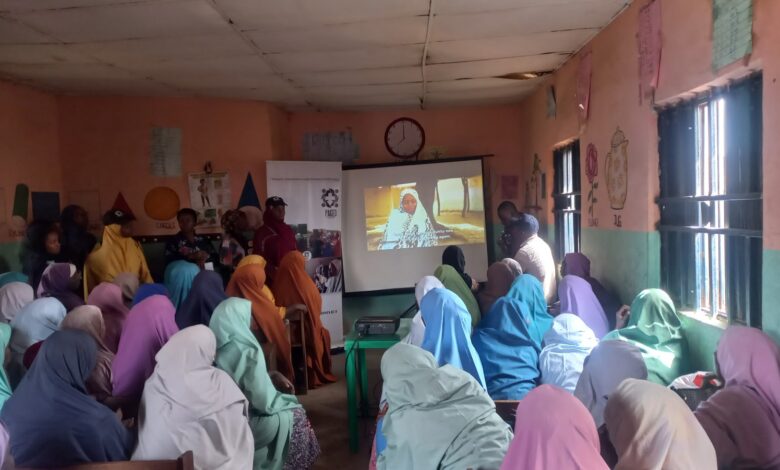‘Our Children In Gov’t Schools Can’t Read,’ Say Parents In Kaduna Communities
A non-governmental organisation, PAGED Initiative, visited Malali and Tudun Ilu for an advocacy campaign that triggered reactions among residents regarding barriers to learning, particularly for girls.

Some parents in Malali and Tudun Ilu communities of Kaduna State, northwestern Nigeria, have complained about the drop in the standard of education in government-run schools during an advocacy campaign carried out by the PAGED (Participatory Communication for Gender Development) Initiative.
Flagged off yesterday, Dec. 13, in Kaduna North, the project began with a six-minute documentary that triggered reactions from residents.
Madina Lawal, a primary school teacher, pointed out that most women in her community enjoyed learning but dropped out due to a lack of funding. “Now, some of them want their children to go to school but lack the financial capacity. There are those who had to withdraw their children from private schools to government schools.” Unfortunately, she said, government schools do not pay attention to having learning materials such as English Readers for the children, which hinders the pupils’ ability to read and write.
There is also the issue of the financial capacity to get girls to further their education successfully. Madina has four daughters, three of whom have completed their secondary school education and written their West African Senior School Certificate Examination (WASSCE).
“The challenge I have now is that they want to go further. One of them applied to Kaduna State University for Medicine. Even as I speak, there are many suitors that came to seek her hand in marriage but she said that is not her priority. Her dream is to become a medical doctor.”
Madina’s husband lost his job in 2020. With her monthly income of ₦20,000 ($25), she struggles to support her family. She has seen her eldest daughter through the necessary examinations she needed to gain admission until her post-UTME at Kaduna State University (KASU). “Now she is awaiting the result. I’m hoping and praying, because we have nothing to support her if she gains admission,” she told HumAngle.
Not long after Uba Sani became governor in 2023, he reduced the fees for Kaduna State tertiary institutions. KASU’s fee of ₦150,000 was lowered to ₦105,000.
Another mother added that financial constraints forced her to transfer her children from private to public schools. But now the economy has grown worse and even the demands of the local government-run LEA schools can hardly be met.
“We want our children to be able to read. Where our husbands could not meet up, we fry bean cakes and engage in other trades in order to buy Readers for our children. But now the government schools they are in don’t even care about English Readers,” she said.
Rahinatu Ibrahim, a mother of nine children, is unable to sponsor her oldest to write WASSCE. She is determined to see her daughters through school because, as she puts it, “education helps people know their rights so that they would not be trampled upon.”
After the women had watched the documentary presented by PAGED Initiative, the men in both communities were also able to watch the film.
Residents of Malali and Tudun Ilu agreed that early marriage was counter-productive to the development of their children. They also argued that the government was in a better position to ensure people at the lower strata of society were given the needed support to enable them to have basic and advanced education.
Programme Director of the organisation, Ummi Bukar, told HumAngle that the project is about young ladies.
“I want to have a situation where we have upcoming advocates for girls education, advocates for gender rights within the communities themselves instead of having them come from somewhere else. Let’s have young people who can grow into the system because they would have insight. Primarily for me, it’s about having people in the communities advocating for girls’ education and going through the process of the advocacy and being champions.”
PAGED Initiative uses media and advocacy in an attempt to “create a society where there are female and male gender-balanced participation and empowerment”. One of its key approaches is making films, which it then shows in mainly rural and underprivileged communities in order to trigger discussions on important topics.
Support Our Journalism
There are millions of ordinary people affected by conflict in Africa whose stories are missing in the mainstream media. HumAngle is determined to tell those challenging and under-reported stories, hoping that the people impacted by these conflicts will find the safety and security they deserve.
To ensure that we continue to provide public service coverage, we have a small favour to ask you. We want you to be part of our journalistic endeavour by contributing a token to us.
Your donation will further promote a robust, free, and independent media.
Donate HereStay Closer To The Stories That Matter




